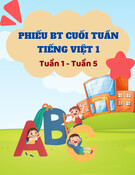
VOCABULARY SET 14: INDULGING
CHILDREN
Vocabulary:
1. adverse (adj): b t l i, tiêu c c, cóấ ợ ự h iạ
2. cope with sth (collocation): đi m t v i đi uố ặ ớ ề gì
3. deprive sb of sth (collocation): t c đo t t ai cáiướ ạ ừ gì
4. developmental stage (collocation): giai đo n phátạ tri nể
5. dire (adj): tàn kh c, thêố th mả
6. inadvertently (adv) - inadvertent (adj): ng u nhiên, vôẫ tình
7. indulge (v) - indulgence (n) - indulgent (adj): nuông chi u - hay chi uề ề theo
8. lenient (adj): khoan dung, nhân h u, dậ ễ dãi
9. over-indulgence (np): vi c nuông chi u tháiệ ề quá
10. parenting problem (collocation): v n đ liên quan đn vi c làm chaấ ề ế ệ mẹ
11. personal hygiene (np): v sinh cáệ nhân
12. preadolescent (adj): v thànhị niên
13. satisfy all the needs (collocation): th a mãn các nhuỏ c uầ
14. spoon-feed (vp): (nghĩa đen) xúc c m;ơ (nghĩa bóng) quá chi uề chu ngộ ai đó, t oạ đi uề
ki nệ quá dễ
dàng cho ai đó
15. unfavourable (adj): b tấ l iợ
Exercises:
Task 1: Write sentences from given cues. Make changes to the cues when needed.
1. although /I / often / indulge / favourite / chocolates /I / maintain / healthy / weight /
exercise/daily.
2. by / give out / print / sheets / facts / theories / teachers / spoon-feed / us / what / we / need /
exam.
3. children / third world / country / very ill / and / dire / need / clean water.
4. there / a lot / website / organisation / that / help / young parent / deal / parenting problem.
5. you / cannot / function / proper / when / you / deprive / sleep

Task 2: Translate from Vietnamese to English
1. Có thể nói h uậ quả kinh hoàng nh tấ c aủ b oạ l cự là nh ngữ v tế th ng,ươ ho cặ cái ch tế mà
ng iườ ngoài
cu c vô tình gánh ph i.ộ ả

2. Khi th y hi u tr ng không tr ng, các th y cô d ng nh d dãi h n đi v i h cầ ệ ưở ở ườ ầ ườ ư ễ ơ ố ớ ọ sinh.
3. M t trong nh ng cách hi u qu nh t đ chúng ta b o v b n thân và nh ng ng i xung quanh ộ ữ ệ ả ấ ể ả ệ ả ữ ườ kh iỏ
b nh t t là nh ng kĩ năng v sinh cá nhân hoànệ ậ ữ ệ h o.ả
4. Nh n ra ph n ng b t l i c a anh y v i thu c, chúng tôi v i đa anh y đn b nhậ ả ứ ấ ợ ủ ấ ớ ố ộ ư ấ ế ệ vi n.ệ
5. Các con tin b giam gi trong m t th i gian dài đn n i h không th xoay s v i th gi i bênị ữ ộ ờ ế ỗ ọ ể ở ớ ế ớ ngoài.
Task 3: Fill in the blanks with suitable words/phrases
Parents often give children everything they ask for and do what they like. Is it good for children?
What are the consequences when they grow up?
1 children has become a common 2 in many modern families. From my
perspective, this practice may create some immediate 3 impacts on children and also results
in long-term consequences for them.
In the short term, it is possible that 4 causes some delay to the process in which children
learn important life skills. This can be seen in a variety of age groups, ranging from toddlers to teenagers.
In Vietnam, for example, many over-caring parents 5 their children until they are five or six,
the 6 in which they should have already been able to eat independently. Also in Vietnam,
there is a common practice that parents assist their 7 children in taking a bath or a shower.
As a result, children may fail to acquire basic 8 skills at the right time.
In the long run, the consequences are even more 9 as over-indulged children grow up. If
parents unconditionally 10 of their children, they may 11 make their children
become over-reliant on other people. When these children enter adulthood, the inability to live
independently can cause some difficulties for them to maintain their overall well-being; for instance, they
may be unaware of what to do when they catch a fever. Furthermore, it is a norm that over-indulgent
parents are 12 and do not require children to face the consequences of their misbehaviour.

In general, this 13 children of the opportunities to learn from mistakes, which may cause
their problem-solving skills to be severely lacking in the future.
From the issues outlined above, one can conclude that over-indulgence may produce a number of 14
effects on children, including the delay in gaining crucial life skills such as self-feeding
and the long-term consequence of lacking the ability 15 as adults in the future.
285 words, written by Tu Pham

Key:
Task 1:
1. Although I often indulge in my favourite chocolates, I maintain a healthy weight by exercising daily.
2. By giving out printed sheets of facts and theories, the teachers spoon-fed us with what we needed for
the exam.
3. The children in third world countries are very ill and in dire need of clean water.
4. There are a lot of websites and organisations that help young parents deal with their parenting
problems.
5. You can't function properly when you're deprived of sleep.
Task 2: Answers may vary
1. Probably the most horrific consequences of violence are the inadvertent injuries or deaths of innocent
bystanders.
2. When the principal is out of the building, the teachers seem to be more lenient with their students.
3. One of the most effective ways we have to protect ourselves and others from illness is perfect personal
hygiene skills.
4. Realizing his intense adverse reaction to the drug, we rushed him to the hospital.
5. The hostages had been confined for so long that they couldn't cope with the outside world.
Task 3:
Parents often give children everything they ask for and do what they like. Is it good for children?
What are the consequences when they grow up?
(1) Indulging children has become a common (2) parenting problem in many modern families. From
my perspective, this practice may create some immediate (3) adverse impacts on children and also results
in long-term consequences for them.
In the short term, it is possible that (4) over-indulgence causes some delay to the process in which
children learn important life skills. This can be seen in a variety of age groups, ranging from toddlers to
teenagers. In Vietnam, for example, many over-caring parents (5) spoon-feed their children until they are
five or six, the (6) developmental stage in which they should have already been able to eat
independently. Also in Vietnam, there is a common practice that parents assist their (7) preadolescent
children in taking a bath or a shower. As a result, children may fail to acquire basic (8) personal hygiene
skills at the right time.
In the long run, the consequences are even more (9) dire as over-indulged children grow up. If parents
unconditionally (10) satisfy all the needs of their children, they may (11) inadvertently make their
children become over-reliant on other people. When these children enter adulthood, the inability to live
independently can cause some difficulties for them to maintain their overall well-being; for instance, they
may be unaware of what to do when they catch a fever. Furthermore, it is a norm that over-indulgent
parents are (12) lenient and do not require children to face the consequences of their misbehaviour. In
general, this (13) deprives children of the opportunities to learn from mistakes, which may cause their
problem-solving skills to be severely lacking in the future.
From the issues outlined above, one can conclude that over-indulgence may produce a number of (14)
unfavourable effects on children, including the delay in gaining crucial life skills such as self-feeding
and the long-term consequence of lacking the ability to (15) cope with problems as adults in the future.





![Bài tập so sánh hơn và so sánh nhất của tính từ [kèm đáp án/mới nhất]](https://cdn.tailieu.vn/images/document/thumbnail/2025/20250808/nhatlinhluong27@gmail.com/135x160/77671754900604.jpg)
![Tài liệu tham khảo Tiếng Anh lớp 8 [mới nhất/hay nhất/chuẩn nhất]](https://cdn.tailieu.vn/images/document/thumbnail/2025/20250806/anhvan.knndl.htc@gmail.com/135x160/54311754535084.jpg)




![Tài liệu Lý thuyết và Bài tập Tiếng Anh lớp 6 [Mới nhất]](https://cdn.tailieu.vn/images/document/thumbnail/2025/20250802/hoihoangdang@gmail.com/135x160/18041754292798.jpg)




